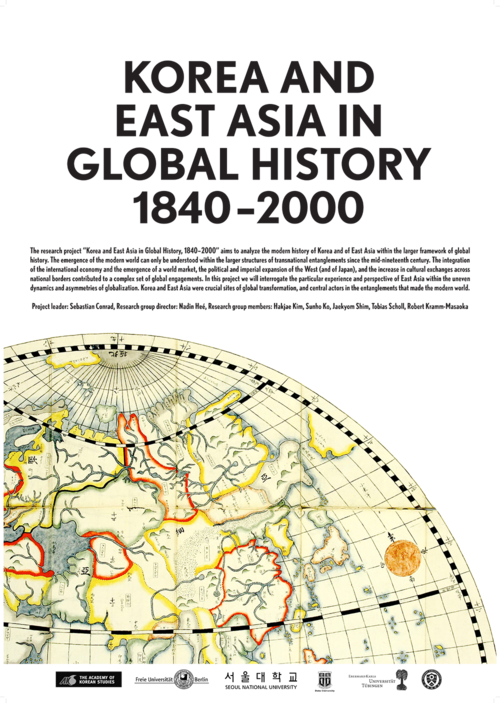Korea and East Asia in Global History 1840-2000
The research project “Korea and East Asia in Global History, 1840-2000” was funded by the Academy of Korean Studies with a total budget of 1.000.000€ for five years, 2011-2015, as part of the Academy’s Global Lab initiative. The project’s point of departure was the observation that research into the modern history of Korea, and of East Asia in general, was still largely conducted in isolation. In European universities, in particular, the history of both Korea and East Asia (in the context of our project, mainly Japan and China) typically remains tied to the paradigm of national history, and to the framework of area studies. In this project, our aim was to move beyond such institutional constraints, and to bring trans-national and global perspectives to bear on the Korean (and East Asian) pasts.
Institutionally, the project was hosted at FU Berlin.
Project members:Sebastian Conrad (FU Berlin), project director
Nadin Heé, Freie Universität Berlin.
Keun-Sik Jung, Seoul National University
Michael Kim, Yonsei University
Jürgen Kocka, ReWork (Work and Human Lifecycle in Global History), Berlin
You-Jae Lee, University of Tübingen
Dominic Sachsenmaier, Duke University/Jacobs University Bremen/Göttingen University
PhD Researchers working in the project:Bo-mi Kim: Development of the Social Survey and (Trans)formation of the Knowledge State: An Analysis of the History of Opinion Surveys in Korea, 1945-2012
Hak Jae Kim: “Cold War Governmentality” in POW Camps during the Korean War
Sunho Ko: The Circulation of Rice in the Japanese Empire
Robert Kramm-Masaoka: Colonized Bodies and Imperial Boundaries: Governmental Practices and Prostitution during the U.S. Occupation of Korea and Japan
Tobias Scholl: Nitchô-Dôsoron – The Common Ancestors Theory
Jaekyom Shim: The US-Military Bases as a Border Zone: Modernity and the Making of Popular Culture in the Postwar Germany, Japan and South Korea from the Transnational Perspective





